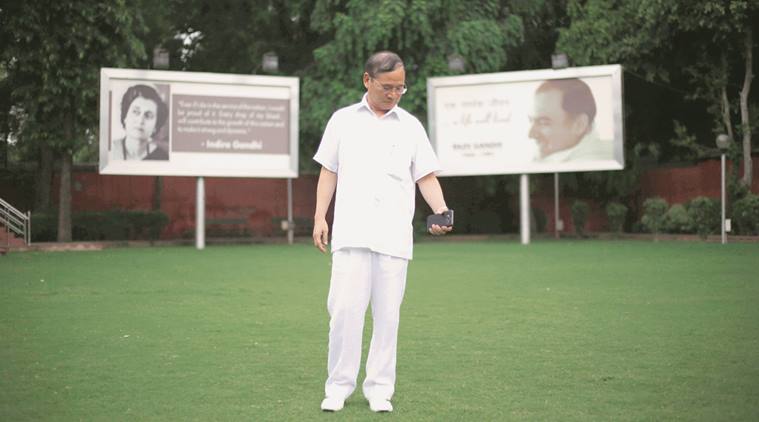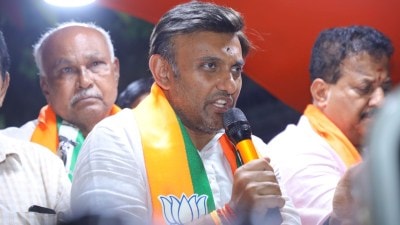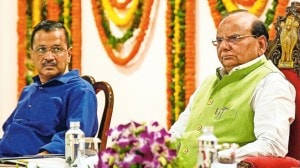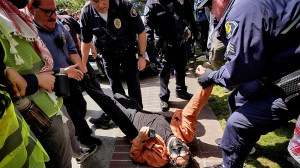- India
- International
Humiliation in Arunachal Pradesh, says SC, Tuki’s govt is restored
5-judge Bench slams Governor for meddling in politics, reminds him of his role.
 Arunachal Pradesh CM Nabam Tuki at the AICC in the capital New Delhi on Wednesday. (Source: Express Photo by Tashi Tobgyal)
Arunachal Pradesh CM Nabam Tuki at the AICC in the capital New Delhi on Wednesday. (Source: Express Photo by Tashi Tobgyal)
Censuring the Governor for “humiliating the elected government of the day”, the Supreme Court Wednesday restored the Congress government of Nabam Tuki in Arunachal Pradesh, and declared as “unconstitutional” all decisions of Governor Jyoti Prasad Rajkhowa that had first led to imposition of President’s rule in the state and later formation of a new government led by a breakaway faction of the Congress.
A five-judge Constitution Bench ordered status quo ante as it prevailed on December 15, 2015 — in effect, Chief Minister Kalikho Pul will have to step down to make way for Tuki to be reinstated at the helm.
The order left red faces in the central government and the BJP since Pul, who took charge on February 20 as the ninth chief minister of the state, had outside support from 11 BJP MLAs.
WATCH VIDEO: Political Implications Of Supreme Court’s Arunachal Verdict
[related-post]

The judgment is historic since it is the first time the Supreme Court has restored a government after it was dismissed — on January 26 — and a new government was sworn in after a spell of President’s rule. On two occasions in the past, the top court had ruled against President’s rule but did not order restoration of the previous government.
In May, the Supreme Court put the Harish Rawat-led Congress government back in the saddle in Uttarakhand and the Centre had to revoke President’s rule after Rawat’s victory in a floor test.
By an unanimous verdict, the Constitution Bench circumscribed the powers of the Governor and held that Rajkhowa’s messages to advance the Assembly session in December and to decide the manner of conducting the Assembly proceedings were violative of constitutional provisions, and that he could not have acted without the aid and advice of the Council of Ministers.
Watch Video: What’s making news
The bench laid down that a Governor cannot have the freedom to determine when and in which situation can he take a decision at his own discretion without the aid and advice of the Chief Minister and his Council of Ministers. He can act without the aid and advice only when a government has lost its majority in a floor test, the court said.
The bench also ruled that once MLAs have sought removal of a Speaker, it will be “constitutionally impermissible” for a Speaker to adjudicate upon disqualification petitions and disqualify MLAs.
In this case, Speaker Nabam Rebia had disqualified 14 rebel Congress MLAs on December 15 even though a resolution regarding his own removal was pending. The apex court order has now brought back 58 MLAs in the 60-member House. Two MLAs had resigned and their seats have been declared vacant.
The bench, headed by Justice J S Khehar, was adjudicating upon Rajkhowa’s authority as he had advanced the Assembly session from January 14, 2016 to December 16, 2015 and directed that the issue of disqualification of the Speaker of the Assembly should be taken up first in view of the notice for disqualification forwarded to him by 13 MLAs — 11 from BJP and two independents.
While the petitions by Speaker Rebia and Deputy Chief Whip of Congress Bamang Felix submitted that it was an overt political act of the BJP MLAs,
supported by the Governor, to undermine the democratic process in the state, Rajkhowa’s counsel defended the decision, contending that the political turmoil with Congress legislators breaking away had prompted these directions. Rajkhowa’s counsel added that there was no need to consult the Council of Ministers, headed by the Chief Minister, since the Constitution empowered him to take decisions in certain cases without aid and advice.
But the bench, also comprising Justices Dipak Misra, Madan B Lokur, P C Ghose and N V Ramana, ruled unequivocally that “the Governor is not the conscience-keeper of the Legislative Assembly” and that he had to stay away from the business of the Assembly besides steering clear of “political horse-trading”.
Underlining that “the exercise of executive power by the Governor, is by and large notional”, the court said that the Constitution does not assign any role to a Governor to interfere in the activities of the Assembly and, therefore, it would be outside the domain of his powers to fix a date for an Assembly session or to decide how the Assembly functions.
The bench also rejected Rajkhowa’s arguments that he had to take note of the political turmoil and a spate of disqualification petitions filed by all sides — Congress, BJP and the breakaway faction of the Congress.
“It needs to be asserted as a constitutional determination, that it is not within the realm of the Governor to embroil himself in any political thicket. The Governor must remain aloof from any disagreement, discord, disharmony, discontent or dissension, within individual political parties,” it said.
“The activities within a political party, confirming turbulence, or unrest within its ranks, are beyond the concern of the Governor. The Governor must keep clear of any political horse-trading, and even unsavoury political manipulations, irrespective of the degree of their ethical repulsiveness. Who should or should not be a leader of a political party, is a political question, to be dealt with and resolved privately by the political party itself. The Governor cannot make such issues a matter of his concern.”
It said that the Constitution does not enjoin upon the Governor the authority to resolve disputes within a political party, or between rival political parties.
“The state legislature does not function under the Governor. In sum and substance, the Governor just cannot act as the Ombudsman of the state legislature. The Governor cannot be seen to have such powers and functions as would assign to him a dominating position over the state executive and the state legislature,” the bench said.
Apr 27: Latest News
- 01
- 02
- 03
- 04
- 05








































